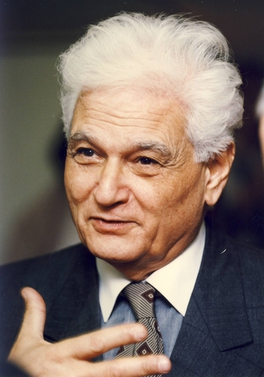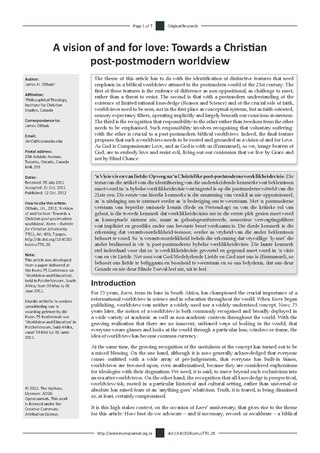Related Research Articles

Jacques Derrida was an Algerian-born French philosopher. He developed the philosophy of deconstruction, which he utilized in a number of his texts, and which was developed through close readings of the linguistics of Ferdinand de Saussure and Husserlian and Heideggerian phenomenology. He is one of the major figures associated with post-structuralism and postmodern philosophy although he distanced himself from post-structuralism and disowned the word "postmodernity".

Hermeneutics is the theory and methodology of interpretation, especially the interpretation of biblical texts, wisdom literature, and philosophical texts. As necessary, hermeneutics may include the art of understanding and communication.
John David Caputo is an American philosopher who is the Thomas J. Watson Professor of Religion Emeritus at Syracuse University and the David R. Cook Professor of Philosophy Emeritus at Villanova University. Caputo is a major figure associated with postmodern Christianity and continental philosophy of religion, as well as the founder of the theological movement known as weak theology. Much of Caputo's work focuses on hermeneutics, phenomenology, deconstruction, and theology.

Being and Time is the 1927 magnum opus of German philosopher Martin Heidegger and a key document of existentialism. Being and Time had a notable impact on subsequent philosophy, literary theory and many other fields. Though controversial, its stature in intellectual history has been compared with works by Kant and Hegel. The book attempts to revive ontology through an analysis of Dasein, or "being-in-the-world." It is also noted for an array of neologisms and complex language, as well as an extended treatment of "authenticity" as a means to grasp and confront the unique and finite possibilities of the individual.
Postmodern theology, also known as the continental philosophy of religion, is a philosophical and theological movement that interprets theology in light of post-Heideggerian continental philosophy, including phenomenology, post-structuralism, and deconstruction.

James Herman Olthuis is an interdisciplinary scholar in ethics, hermeneutics, philosophical theology, as well as a theorist and practitioner of psychotherapy of a kind he calls "relational psychotherapy".

Jean-Luc Marion is a French philosopher and Roman Catholic theologian. Marion is a former student of Jacques Derrida whose work is informed by patristic and mystical theology, phenomenology, and modern philosophy. Much of his academic work has dealt with Descartes and phenomenologists like Martin Heidegger and Edmund Husserl, but also religion. God Without Being, for example, is concerned predominantly with an analysis of idolatry, a theme strongly linked in Marion's work with love and the gift, which is a concept also explored at length by Derrida.
Richard Kearney is an Irish philosopher and public intellectual specializing in contemporary continental philosophy. He is the Charles Seelig Professor in Philosophy at Boston College and has taught at University College Dublin, the Sorbonne, the University of Nice, and the Australian Catholic University. He is the author of 23 books on European philosophy and literature and has edited or co-edited over 20 more. He was formerly a member of the Arts Council of Ireland, the Higher Education Authority of Ireland and chairman of the Irish School of Film at University College Dublin. He is also a member of the Royal Irish Academy. As a public intellectual in Ireland, he was involved in drafting a number of proposals for a Northern Irish peace agreement. He has presented five series on culture and philosophy for Irish and British television and broadcast extensively on the European media. He is currently international director of the Guestbook Project.
Ontotheology means the ontology of God and/or the theology of being. While the term was first used by Immanuel Kant, it has only come into broader philosophical parlance with the significance it took for Martin Heidegger's later thought. While, for Heidegger, the term is used to critique the whole tradition of 'Western metaphysics', much recent scholarship has sought to question whether 'ontotheology' developed at a certain point in the metaphysical tradition, with many seeking to equate the development of 'ontotheological' thinking with the development of modernity, and Duns Scotus often being cited as the first 'ontotheologian'.

James K. A. Smith is a Canadian-American philosopher who is currently Professor of Philosophy at Calvin University, holding the Gary & Henrietta Byker Chair in Applied Reformed Theology & Worldview. He is the current editor-in-chief of the literary journal Image.
Robert L. Bernasconi is Edwin Erle Sparks Professor of Philosophy at Pennsylvania State University. He is known as a reader of Martin Heidegger and Emmanuel Levinas, and for his work on the concept of race. He has also written on the history of philosophy.
John Russon is a Canadian philosopher, working primarily in the tradition of Continental Philosophy. In 2006, he was named Presidential Distinguished Professor at the University of Guelph, and in 2011 he was the Shastri Indo-Canadian Institute's Canadian Lecturer to India.
Hugh J. Silverman was an American philosopher and cultural theorist whose writing, lecturing, teaching, editing, and international conferencing participated in the development of a postmodern network. He was executive director of the International Association for Philosophy and Literature and professor of philosophy and comparative literary and cultural studies at Stony Brook University, where he was also affiliated with the Department of Art and the Department of European Languages, Literatures, and Cultures. He was program director for the Stony Brook Advanced Graduate Certificate in Art and Philosophy. He was also co-founder and co-director of the annual International Philosophical Seminar since 1991 in South Tyrol, Italy. From 1980 to 1986, he served as executive co-director of the Society for Phenomenology and Existential Philosophy. His work draws upon deconstruction, hermeneutics, semiotics, phenomenology, aesthetics, art theory, film theory, and the archeology of knowledge.
Roberto Rino Magliola is an Italian-American academic specializing in European hermeneutics and deconstruction, comparative philosophy, and inter-religious dialogue. He is retired from National Taiwan University and Assumption University of Thailand.

Leonard "Len" Lawlor is Edwin Erle Sparks Professor of Philosophy at Pennsylvania State University. He specializes in nineteenth- and twentieth-century Continental philosophy.
John Llewelyn was a Welsh-born British philosopher whose extensive body of work, published over a period of more than forty years, spans the divide between Analytical and Continental schools of contemporary thought. He has conjoined the rigorous approach to matters of meaning and logic typical of the former and the depth and range of reference typical of the latter in a constructive and critical engagement with the work of Jacques Derrida and Emmanuel Levinas.

Mark Dooley is an Irish philosopher, writer and newspaper columnist. A specialist in continental philosophy, theology and the philosophy of religion, he is the author of several books, including The Politics of Exodus: Kierkegaard's Ethics of Responsibility (2001), Roger Scruton: The Philosopher of Dover Beach (2009), and Why Be a Catholic? (2011).

Edward S. Casey is an American philosopher and university professor. He has published several volumes on phenomenology, philosophical psychology, and the philosophy of space and place. His work is widely cited in contemporary continental philosophy. He is currently Distinguished Professor Emeritus of Philosophy at Stony Brook University in New York and distinguished visiting faculty at Pacifica Graduate Institute.
Patrick Aidan Heelan, S.J. was an Irish Jesuit priest, physicist, and philosopher of science. He was William A. Gaston Professor of Philosophy at Georgetown University.
References
- ↑ The majority of entries in this bibliography are sourced from Syracuse University. John D. Caputo, Thomas J. Watson Professor of Religion and Humanities. Retrieved 13 September 2012.
- ↑ Camilleri, René (October 18, 2009). "Reinvent the Church". Times of Malta. Retrieved 20 August 2012.